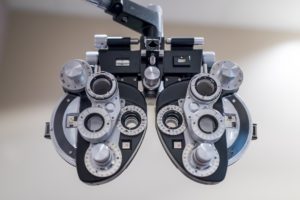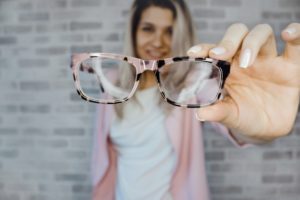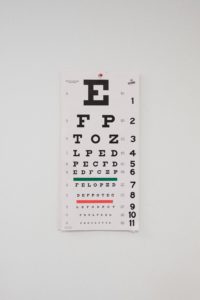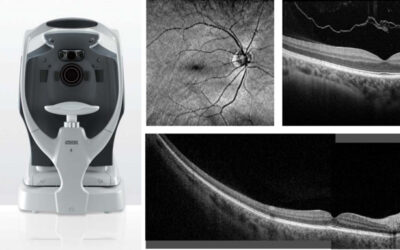15 FAQs for Better Eye Health

We all know better than to trust the internet to answer our health questions. Google is not a diagnostic tool, and for every piece of useful information there’s a dozen other suspicious sites selling miracle solutions or telling you that your headache is something sinister.
Next time you’re seeking advice for floating spots in your vision, wondering if you have eye disease, or wanting to know if it’s okay to sleep with your contacts in (hint: it’s not), come to us at Greenlane Penrose Optometrist.
This month we’ve pulled together 15 frequently asked questions about eye health and prescription glasses, to give you a trusted resource next time you need help.
Call our team for help with your eye health today.
1. How often do I need to get an eye test, and is it expensive?
We recommend having an eye test every two years — that’s how often we recall our patients. The exception to this is children or people who have a specific concern that needs monitoring: we recall them every year.
We charge $90 for adults and $65 for children, for a thorough 45-minute eye exam that tests multiple facets of your eyesight. When you factor this in as an annual or bi-annual cost, it’s a very affordable routine.
2. What’s involved in an eye exam?
An eye exam covers multiple areas of your vision:
1. Firstly, we discuss your history of eye issues, your current situation,  and your family history of refractive error (short-sightedness or long-sightedness).
and your family history of refractive error (short-sightedness or long-sightedness).
2. We’ll measure your vision, to find out what you can and can’t see.
3. Then we’ll look at how your eyes work together as a team, and determine if you have refractive error.
4. Next we inspect the front surface of your eye, checking for dryness, inflammation, or allergies.
5. Looking inside your eyes, we look for signs of eye disease or medical problems such as high blood pressure and diabetes.
Finally, we finish with another conversation about what we’ve found and what that means. We’ll make a plan to follow up, refer you onwards, or provide prescription glasses or contact lenses to suit your needs.
3. How do I know if contact lenses are right for me?
A lot of people think they can’t have contact lenses, but this isn’t true — there are in fact very few prescriptions we can’t correct with contacts. In an eye exam, when we examine the surface of your eyes we’ll be able to determine if you can physically wear contacts, then the rest will depend upon your specific prescription needs.
Additionally, contact lenses involve some effort and ongoing expense, so this must be considered before making it part of your lifestyle.
4. What’s the difference between off-the-shelf reading glasses and prescription glasses?
Off-the-shelf reading glasses have the same strength in each eye, and they’re only available in limited strengths. They won’t work for anyone with a difference between their eyes, or for more complicated situations — they’re specifically just for extra magnification.
When we give someone prescription glasses, we’ve done a careful test to know what each eye needs. We set up the glass at the right level within the frames for where you’d naturally look through them. Our frames and glass are high quality, and made to last.
5. How do I know when I need a new prescription?
We quite often get people coming in and saying “I’m not seeing as well”, or “My eyes are getting sore”, “My eyes are tired”, “I’m getting headaches” … all these are classic signs that you may be needing a change of prescription.
When we test your eyes, we look at how your current vision ability compares to where you should be, and can recommend whether or not you need a new prescription.
6. What do I do if I lose my prescription glasses?

Call us straight away! We’ll know what you’ve been using, and can sometimes find a stopgap until your new pair is ready. We can also tie this in with an exam to ensure you’re still using the right prescription for your vision.
A lot of people claim insurance for lost prescription glasses. If your insurer needs more information about your glasses and their cost, we’ve got all that on file. We can also make a claim directly to your insurance company on your behalf — just let us know your claim number, we’ll sort out the rest!.
7. What does it mean if my eye keeps twitching?
Sometimes this means nothing at all. Some common causes are exhaustion, stress, eye strain, needing glasses, or even a nerve triggering itself for no reason. Twitching eyes usually resolve themselves, but if it keeps going then it’s likely to be a muscular spasm.
8. What are the floating dots in my vision?
They’re called “floaters”, and they live in the middle part of your eyeball in the vitreous gel. In children, this part of the eye is perfectly clear, but as you get older it becomes watery with thicker parts globbed together — it’s the shadow of these globs that you see as your eyes move.
Floaters are common, and mostly harmless. You only need to be concerned if you have a sudden change in your floaters: if you see a lot of them at once, or if a big one pops up out of nowhere. In that instance, please come in for a check.
9. What are early signs of eye disease?
In the early stages of eye disease, your symptoms could be subtle or non-existent. This is why we recommend that you have eye tests regularly, particularly if you’re over the age of 50. If you’re hoping to be forewarned and receive early treatment for a condition, often the only way to achieve this is through regular eye exams.
10. Can I play sports with my glasses on?
In theory, yes. In practice … well, if you’ve got nice prescription glasses would you really want to risk damaging them? We do have sports-suitable frames for your prescription lenses, or you could look at wearing contacts.
11: Will eating carrots really help me to see in the dark?
Not at all. This is an urban myth that stems from old WW2 propaganda! The British airforce spread this information to convince Germans that British pilots could see them coming in the dark. It was all a big ruse but it’s stuck. Carrots do contain beta-carotene, which is a useful nutrient for your vision, but they won’t give you night vision.
12: What does 20/20 vision mean?
 When measuring your vision, there’s a specific size of letter that a normal-sighted person can see from 20ft away. The 20/20 measurement is American, because they use feet, but in New Zealand, we call it 6/6, referring to the 6m distance.
When measuring your vision, there’s a specific size of letter that a normal-sighted person can see from 20ft away. The 20/20 measurement is American, because they use feet, but in New Zealand, we call it 6/6, referring to the 6m distance.
6/6 vision is the standard for normal-sighted people. Plenty of people have better sight than that though — on the chart we’ve got rows for 6/5 and 6/4.5, meaning you can read it from 6m but the normal-sighted person would need to advance to 5m and 4.5m to read those letters.
13: Can I sleep in my contacts?
Generally, no. There are contacts that have been designed for sleeping in, and we call them continuous wear, but most of our normal contact lenses are not to be slept in.
14: Is it bad to wear my partner’s prescription glasses, if I don’t have my own?
It’s not that bad, it won’t ruin your eyes, but they’re not likely to be comfortable. It may make your eyes tired or sore, and you may get a headache if you wear them for too long, but they won’t cause any lasting damage to your eyes.
15: If my parents are both long-sighted/short-sighted, does that mean I will be too?
 Maybe, but not necessarily. You are at greater risk if both your parents have refractive error, but it’s not always going to mean you’ll have problems too. In some cases, having parents who wear glasses can be beneficial as it makes you more aware of your own eye health and more comfortable getting checks done.
Maybe, but not necessarily. You are at greater risk if both your parents have refractive error, but it’s not always going to mean you’ll have problems too. In some cases, having parents who wear glasses can be beneficial as it makes you more aware of your own eye health and more comfortable getting checks done.
Got questions about your eye health? Get in touch today.
Featured Posts
Focus on Paul Taylor Eyewear
Sometimes we don’t realise that the names behind our favourite brands are actually real people, or that they’re still not only alive but actively designing under the banner of their brand name….
New, Improved Optometry Equipment
Regulars to Greenlane Penrose Optometrist might notice a few changes and improvements during their next eye exam. We’ve been busy setting up new and exciting technology in the practice…
Address
Cnr Great South Road & Rockfield Road, Greenlane 1051
Phone
09 525 1516
Hours
Mon to Fri: 9am – 5pm
Sat to Sun: Closed
Holidays: Closed


